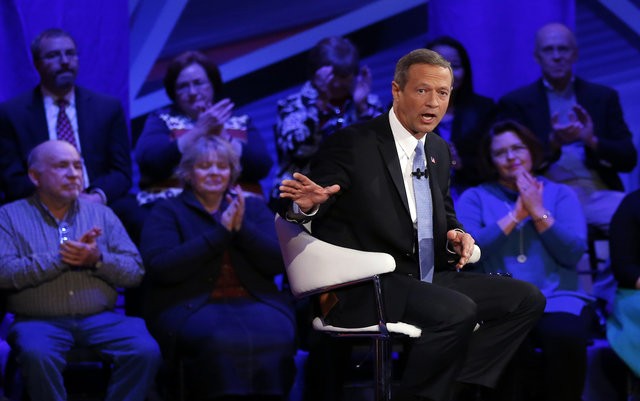The presidential race is heating up, and the three remaining Democratic candidates looked to stoke their fires at the Iowa Town Hall Meeting on Monday evening. This was a chance for them to make their final cases in preparation for the upcoming Iowa caucus.
Unlike the debates, town hall style meetings are an open forum where one by one, each candidate answers questions posed by audience members. Imagine a smaller rally of local voters surrounding a stage where politicians get to defend their views, not battle one another from a podium.
Directly answering the people’s questions and concerns is a great way for candidate to explain their political platforms in depth. The three hopefuls had an opportunity to address the uncertainties undecided voters had, and persuade others to give their perspectives another look.
Over the course of the town hall, Hillary Clinton and Bernie Sanders were both asked to differentiate their stance from one another, and critique each other’s political ads. Martin O’Malley defended his controversial history as Mayor of Baltimore, and was asked who his supporters should side with if he’s forced to drop out of the race.
O’Malley has quite the uphill battle ahead. His national polling numbers are so low (only 2 percent in the latest CNN/ORC poll), that the race will most likely be between Vermont Senator Bernie Sanders and Secretary Hillary Clinton.
One of the highlights of the evening was when the underdog of the Democratic pack was asked to explain his controversial tenure in Maryland.
An Iowa voter pressed him on his past asking; “Your history as mayor of Baltimore and governor of Maryland show that you pushed for zero tolerance policing and felony punishments for low level drug offenders, which usually affects the black population. How are you planning to ensure racial equality when your history in office contradicts your current platform to fight structural racism?”
O’Malley defended his time in Maryland, explaining how he oversaw the decriminalization of marijuana, implemented police oversight, and shut down the open drug markets in Maryland.
“I told the people of my city look, we did not have to accept the reality of 24/7 drug dealer occupation over our poor neighborhood. When you call from a poor neighborhood for a police service, they should respond the same way that they do in wealthier neighborhoods, black and white.
There are a lot of things we got right. There were a lot of lives that we saved. I promise to improve how we police the police. We actually did start closing down open air drug markets.
And in the course of my executive service both as mayor and as a governor, I never stop searching for the things that work so we can do more of them to save and redeem lives, and the things that don’t work so that we can stop doing them. So we greatly increased drug treatment. We saved hundreds and hundreds of lives from overdose deaths.
We started tracking discourtesy, excessive force. I drove down use of fatal police-involved — fatal police-involved shootings to three of their four lowest years in Baltimore history.
And as governor, I restored voting rights to 52,000 people. I repealed as a crime and decriminalized the possession of marijuana. I banned the box on people who are applying for state employment.”
It’s usually his go-to example of success, but it’s also one of O’Malley’s most highly criticized issues – one that he constantly stumbles over in debates.
Could his time in Maryland turn out to be his downfall?
In his last debate night appearance in North Carolina, O’Malley brought up his policing reforms.
Here is what he said in response to the moderator’s question, “do black lives matter?”
“And that’s why I ran, because, yes, black lives matter. And we did a number of things. We weren’t able to make our city immune from setbacks as the Freddie Gray unrest and tragic death showed.
We were able to save a lot of lives doing things that actually worked to improve police and community relations. The truth of the matter is, we created a civilian review board. And many of these things are in the new agenda for criminal justice reform that I’ve put forward.
We created a civilian review board, gave them their own detectives. We required the reporting of discourtesy, use of excessive force, lethal force. I repealed the possession of marijuana as a crime in our state.”
The issue is that not everyone agrees that his reforms brought positive change.
This Washington Post article explains the disconnect between the way people in Baltimore saw his “zero-tolerance” policy and how O’Malley sees it; “O’Malley also touts a police crackdown during his time as mayor that led to a stark reduction in drug violence and homicides as one of his major achievements. Yet some civic leaders and community activists in Baltimore portray O’Malley’s policing policies in troubling terms. The say the “zero-tolerance” approach mistreated young black men even as it helped dramatically reduce crime, fueling a deep mistrust of law enforcement…”
This alleged mistrust, some say, led to the outrage and violence seen in Baltimore following the death of Freddie Gray this summer.
His limited time in office has forced his hand to play the Baltimore card at every major event, and with the Black Lives Matter movement and riots following the death of Freddie Gray, this could be his swan song before he exits the race for good.
“I’m Not A Divider”
The Des Moines Register, the biggest newspaper in Iowa, has come out endorsing Clinton for president. In their announcement they wrote that O’Malley was “better suited as one of her cabinet secretaries than as president.”
The town hall moderator gave O’Malley the chance to refute.
“Our country is facing big challenges. And we have deep divisions in our country. And we need a candidate who can actually pull us together, who can heal these divisions, who can get things done,” O’Malley said.
He went on to use his time as Mayor of Baltimore, a highly controversial and criticized administration, as an example of why he is “not a divider.”
“That’s what I’ve done all my life. I’m not a divider. If I were, I would not have been able to accomplish the things we accomplished in a very troubled city or in our state through a recession.”
He served as mayor from 1999 through 2007, then held the office of the Governor until 2015 – the highest office to which he’s been elected.
With decades of experience in Congress, Clinton and Sanders simply have more favorable, undisputed experiences of leadership to draw upon than O’Malley.
Down But Not Out
O’Malley needs at least 15 percent of the delegate in Iowa in order to be considered a viable candidate, a rule specific to the Democratic caucus. This could prove to be very, very difficult given his poor polling numbers.
Not backing down, O’Malley gave a cautiously optimistic smile when asked which candidate he would tell his supporters to adopt in his absence.
“My message to the O’Malley supporters across this state is this: Hold strong at your caucus,” O’Malley shouted.
“Lift up a new leader, that’s what I have to offer. So we can make America compassionate and inclusive place it needs to be,” O’Malley stated in his final plea for the presidency.
The Democrat and Republican Iowa caucuses will be held on Monday.






